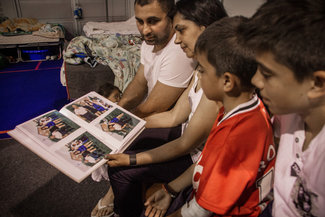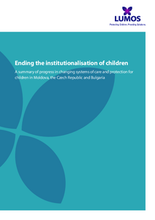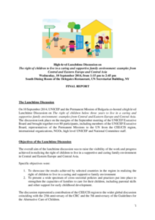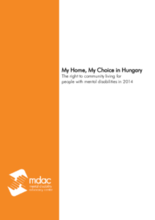

Displaying 861 - 870 of 1075
This article from Deutsche Welle (DW) depicts the situation that many mothers in Eastern Europe face as they leave their children behind to find work abroad and support their families financially.
Eurochild is holding its 11th Annual Conference, 'Children First: Better Public Spending for Better Outcomes for Children and Families' in Bucharest, 26-28 November 2014
This report presents a summary of progress in Lumos’ first three country demonstration programmes – the Republic of Moldova, the Czech Republic and Bulgaria.
Andrea Mazzarino, a researcher for Human Rights Watch, visited Russian orphanages as part of a human rights investigation into the conditions and potential abuses in the orphanage system, especially for children with disabilities.
Three former orphans with severe disabilities attempt to make the grueling ascent to Africa’s highest peak to help Russian orphanages. Their Journey is documented in a new RT documentary.
Près de 30 pour cent de tous les enfants en situation de handicap en Russie vivent dans des orphelinats de l'État où ils sont parfois en proie à la violence et la négligence, a déclaré Human Rights Watch dans un rapport publié aujourd'hui. La Russie devrait mettre fin au mauvais traitement des enfants en situation de handicap dans les services de l'État et faire une priorité du soutien fourni pour que les enfants handicapés vivent avec leurs familles ou dans d'autres environnements familiaux, plutôt que dans des institutions.
On 10 September 2014, UNICEF and the Permanent Mission of Bulgaria co-hosted a high level Lunchtime Discussion on The right of children below three years to live in a caring and supportive family environment: examples from Central and Eastern Europe and Central Asia.
United Nations Children’s Fund in Moldova is seeking International Individual Consultant on Human Resources and Training Needs Assessment in social work in the Republic of Moldova.
Despite Hungary signing on to the UN Convention on the Rights of Persons with Disabilities (CRPD), there has been no significant change in the number of people with disabilities in Hungary who are placed in institutions. Mass institutionalisation continues to be the predominant form of care for people--including many children--with mental health issues and intellectual disabilities.




